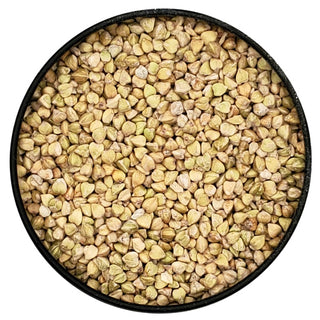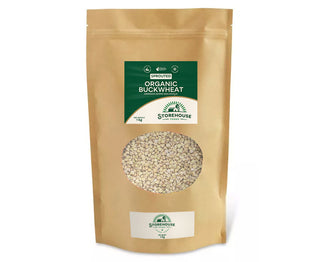Organic Sprouted Buckwheat
- Unit price
- / per
Organic Sprouted Buckwheat
Product of Canada
- Rich in Nutrients and Antioxidants: Organic sprouted buckwheat is a powerhouse of nutrition, offering a significant amount of high-quality protein, fiber, and essential amino acids. It is particularly rich in lysine, which is often lacking in grains. Additionally, sprouting increases its antioxidant content, including rutin and quercetin, which are known for their anti-inflammatory and heart health benefits.
- Improves Digestibility and Nutrient Absorption: The sprouting process reduces the presence of antinutrients such as phytic acid, which can inhibit the absorption of minerals like iron and calcium. This makes the nutrients in buckwheat more bioavailable, meaning your body can absorb them more efficiently, enhancing overall nutrition.
- Supports Heart Health: Organic sprouted buckwheat has been linked to improved heart health due to its high content of magnesium, potassium, and fiber. Magnesium and potassium help to regulate blood pressure, while fiber can lower bad LDL cholesterol levels, reducing the risk of heart disease.
- Gluten-Free and Hypoallergenic: For those with gluten sensitivities or celiac disease, organic sprouted buckwheat is an excellent choice as it is naturally gluten-free. It's also a good alternative for people with allergies to common grains like wheat, as it is less likely to cause allergic reactions.
- Versatile in Culinary Uses: Beyond its health benefits, sprouted buckwheat is incredibly versatile in the kitchen. It can be used in a variety of dishes, from breakfast cereals and granolas to salads, soups, and even gluten-free baked goods. Its slightly nutty flavor and enhanced nutritional profile make it a nutritious addition to any meal.
For centuries, people wouldn’t eat grains and beans without natural processing like soaking, sprouting and fermenting. Cultures all over the world understood that proper preparation was vital to increase digestibility and nutrient availability. Some cultures passed this wisdom down through generations, while others lost it through industrialization.
Today, sprouting is resurging as more people seek foods prepared in slow and traditional ways. Sprouting offers no shortcuts, so customers trust that they are receiving a wholesome and healthful product.
For many people, unsprouted grains and beans cause digestive discomfort. Sprouting activates starch, protein and lipid degrading enzymes that “pre-digest” seeds. Namely, it converts dense proteins and complex carbs into more digestible amino acids and simple sugars. Despite the starch to sugar conversion, sprouted grains have a very low glycemic index.
All grains also contain nutrient inhibitors to protect valuable nutrients from being utilized until optimal growing conditions are met. Unfortunately, these prevent us from fully absorbing the seed’s nutrients. Sprouting unlocks nutrient inhibitors like phytic acid, depending on the seed and sprouting time. For example, chickpeas sprouted for 48 hours have a 67% decrease in phytic acid. For this reason, sprouted grains, seeds and beans are considered more digestible and bioavailable.
Optimize Baking Performance
- Increase loaf volume
- Softer and fluffier texture than unsprouted whole grains
- Richer and more complex taste profiles
- No bitterness, resulting in a sweeter flavour
- Low glycemic index
- Need less sugar in recipe
- Longer shelf life (over 1 year for flour)
- Bread stales at a slower rate
Intact grain can be stored for up to 6 months in a cool dry location, or 1 year in a freezer. Once milled, it can be stored in a cool dry location for 3 months or 6 months in a freezer.
Disclaimer: This information is for educational purposes only. It is not intended to diagnose, treat, cure, or prevent any disease. The information provided is for educational purposes only and not intended as medical advice. Consult your professional health expert for medical advice. This product has been packaged in the same facility as wheat, tree nuts, barley, and other potential allergens.
Organic Sprouted Buckwheat
- Unit price
- / per
Adding product to your cart
You may also like
Organic Sprouted Buckwheat
Product of Canada
- Rich in Nutrients and Antioxidants: Organic sprouted buckwheat is a powerhouse of nutrition, offering a significant amount of high-quality protein, fiber, and essential amino acids. It is particularly rich in lysine, which is often lacking in grains. Additionally, sprouting increases its antioxidant content, including rutin and quercetin, which are known for their anti-inflammatory and heart health benefits.
- Improves Digestibility and Nutrient Absorption: The sprouting process reduces the presence of antinutrients such as phytic acid, which can inhibit the absorption of minerals like iron and calcium. This makes the nutrients in buckwheat more bioavailable, meaning your body can absorb them more efficiently, enhancing overall nutrition.
- Supports Heart Health: Organic sprouted buckwheat has been linked to improved heart health due to its high content of magnesium, potassium, and fiber. Magnesium and potassium help to regulate blood pressure, while fiber can lower bad LDL cholesterol levels, reducing the risk of heart disease.
- Gluten-Free and Hypoallergenic: For those with gluten sensitivities or celiac disease, organic sprouted buckwheat is an excellent choice as it is naturally gluten-free. It's also a good alternative for people with allergies to common grains like wheat, as it is less likely to cause allergic reactions.
- Versatile in Culinary Uses: Beyond its health benefits, sprouted buckwheat is incredibly versatile in the kitchen. It can be used in a variety of dishes, from breakfast cereals and granolas to salads, soups, and even gluten-free baked goods. Its slightly nutty flavor and enhanced nutritional profile make it a nutritious addition to any meal.
For centuries, people wouldn’t eat grains and beans without natural processing like soaking, sprouting and fermenting. Cultures all over the world understood that proper preparation was vital to increase digestibility and nutrient availability. Some cultures passed this wisdom down through generations, while others lost it through industrialization.
Today, sprouting is resurging as more people seek foods prepared in slow and traditional ways. Sprouting offers no shortcuts, so customers trust that they are receiving a wholesome and healthful product.
For many people, unsprouted grains and beans cause digestive discomfort. Sprouting activates starch, protein and lipid degrading enzymes that “pre-digest” seeds. Namely, it converts dense proteins and complex carbs into more digestible amino acids and simple sugars. Despite the starch to sugar conversion, sprouted grains have a very low glycemic index.
All grains also contain nutrient inhibitors to protect valuable nutrients from being utilized until optimal growing conditions are met. Unfortunately, these prevent us from fully absorbing the seed’s nutrients. Sprouting unlocks nutrient inhibitors like phytic acid, depending on the seed and sprouting time. For example, chickpeas sprouted for 48 hours have a 67% decrease in phytic acid. For this reason, sprouted grains, seeds and beans are considered more digestible and bioavailable.
Optimize Baking Performance
- Increase loaf volume
- Softer and fluffier texture than unsprouted whole grains
- Richer and more complex taste profiles
- No bitterness, resulting in a sweeter flavour
- Low glycemic index
- Need less sugar in recipe
- Longer shelf life (over 1 year for flour)
- Bread stales at a slower rate
Intact grain can be stored for up to 6 months in a cool dry location, or 1 year in a freezer. Once milled, it can be stored in a cool dry location for 3 months or 6 months in a freezer.
Disclaimer: This information is for educational purposes only. It is not intended to diagnose, treat, cure, or prevent any disease. The information provided is for educational purposes only and not intended as medical advice. Consult your professional health expert for medical advice. This product has been packaged in the same facility as wheat, tree nuts, barley, and other potential allergens.







